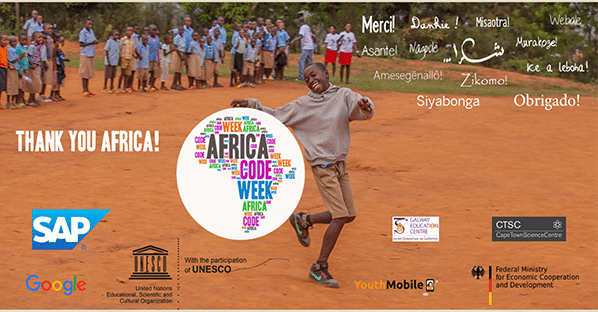Skills development initiative surpasses expectations as it makes strides toward goal of training 5m African youth by 2025
SAP’s ambitious goal of equipping 5 million African youth with basic coding skills by 2025 took a bold step forward following the release of the results of this year’s Africa Code Week. Almost 427,000 youth from 30 African countries completed training between 15 and 23 October, dramatically exceeding the initial participation target of 150,000 students.
Africa Code Week is a continent-wide initiative to spark the interest of African children, teenagers and young adults in software coding. Spearheaded by SAP in 2015 as part of its social investments to drive sustainable growth in Africa, Africa Code Week (ACW) is the story of hundreds of schools, teachers, ministers, community centers, code clubs, NGOs, businesses and non-profits getting together to give birth to the largest digital literacy initiative ever organised on the African continent.
“In Southern Africa, we trained more than 32,600 students of which 56,5% were female,” says Claire Gillissen-Duval, Global Project Lead for Africa Code Week. “In Lesotho, Africa’s poorest and least populated country, we engaged more than 5,245 youth with the help of our partners, UNESCO Science and Mathematics Education Foundation, Department of Science and Technology and Department of Education. This puts Lesotho firmly in second place in Southern Africa. With Africa contributing more than half of global population growth by 2050, the continent will play a leading role in the future global economy. By learning basic coding skills in an open, supportive environment, Africa’s youth are able to take advantage of the immense opportunities presented by the Digital Revolution and become active players shaping the global economy.”
Africa Code Week’s long-term goal is to empower more than 200,000 teachers and positively impact the lives of 5 million children and youth within the next 10 years. Key partners include the Cape Town Science Centre and the Galway Education Centre. Strategic Partners include UNESCO, Google, the German Federal Ministry for Economic Cooperation and Development, Ampion, King Baudouin Foundation, ALink Telecom, Camara Education and many more.
With the highest engagement ratio of 0,47% youth per 100,000 population and a total of 165,352 introduced to coding during this year’s initiative, Morocco wins the continent-wide Africa Code Week 2016 award, retaining their top spot from last year. Cameroon was second with 0,26% per 100,000 youth engaged and a total of 62,918 introduced to coding, while Lesotho took third place with an engagement rate of 0,24%.
Other key highlights for Southern Africa include:
- 11 Kick-and-Code events took place during the run-up to Africa Code Week in Cape Town, Johannesburg and Pretoria. The unique events combined football with a fun afternoon of coding at various schools across South Africa;
- Google micro-grant winner, Rogeema Kenny, trained more than 1,200 Western Cape youth in just ten days.
Brett Parker, Managing Director of SAP Africa says: “Africa Code Week 2016 exceeded all expectations and has made a significant impact on the skills development of Africa’s youth. And with total female participation reaching 48,6%, this year’s initiative also made inroads into gender equality in African ICT education. We will now build on the success of our first two years and, with the help of our partners, start preparing for Africa Code Week 2017.”
For more information, visit the SAP News Center or visit the Africa Code Week website www.africacodeweek.org



